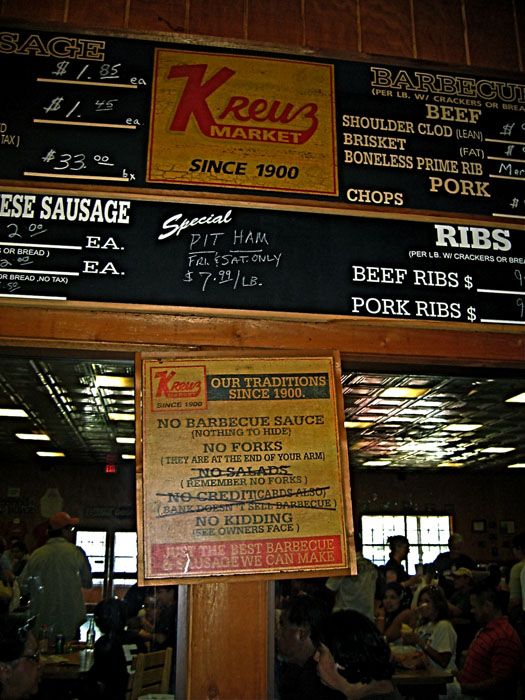Just Don’t Call It BBQ

RICK SCHMIDT OF KREUZ MARKET. PHOTOS BY ESTHER WEISBROD
Lockhart, Texas, which is located 30 minutes south of Austin, was designated by the state legislature as the “Barbecue Capital of Texas. It makes sense, as the pounds of meat its restaurants churn out per week far outnumber the town’s 11,000 residents. Black’s, which advertises itself as the oldest barbecue joint in Texas owned by one family, was a favorite of LBJ; Smitty’s has a heavy brick barbecue pit that’s about a hundred years old; and Kreuz Market (pronounced “Krites”), which started as a meat market at the turn of the 20th century, is consistently named one of the top barbecue joints in Texas and the U.S.
These places offer a Biblical experience: visitors are confronted by open fire pits and clouds of smoke, a suffocating atmosphere that can be difficult to take while waiting to order. Somehow, employees cope. Customers order beef brisket, pork ribs, and ham by the pound and receive a pile of meat on butcher paper and not much else–no barbecue sauce, no forks. Rugged men in Western wear drink local Shiner Bock beer or Big Red soda while pulling apart brisket with their fingers.
Rick Schmidt, owner of Kreuz Market, talked to me about why Texas barbecue is so special and which Manhattan barbecue pit has his endorsement.
ESTHER WEISBROD: What do you think makes barbecue from around here so special?
RICK SCHMIDT: Here at Kreuz Market, we still do things the hard way. Our pits are labor intensive, nothing automatic about ‘em. We buy the best meat we can for cooking and lightly season it. We like the way meat tastes-we don’t want to cover it up. We just enhance it. And we get our flavor using local post oak wood and mild seasoning. Lot of places, competition barbecue cook-offs and stuff, they put so much stuff on it trying to find that secret flavor, and I can remember my father saying it, he said, “The Kreutz’s said it: ‘The secret here is not what you put on it, it’s what you leave off.'”
WEISBROD: I see you’re reading a Dallas Morning News article about Hill Country Barbecue in New York? Have you been there?
SCHMIDT: I went up and helped ‘em open. The owner’s father and I grew up together. His father’s from Lockhart—the Glosserman family, and they had a Glosserman Chevrolet and they also had a clothing store here in town. Michael and I graduated together from high school. And Marc [Glosserman, owner of Hill Country] always wanted to be in the barbecue business. It’s hard to do it from a long ways off, and they have different laws and everything up there as to what they can do. You know they can’t have open fires like we have here. I did show them how to cook on those pits, similar to what we do here. They do a good job, with what they have to work with up there. It’s a different world.
WEISBROD: They don’t have Shiner, and restaurants sell cans of Lone Star for $5 and up.
SCHMIDT: In Mark’s defense, it wasn’t because he didn’t try. For some reason, Shiner doesn’t have distribution up there or doesn’t want it. It might be a market they can’t handle. The brewery might be running at capacity. But he’s tried. Before he got Big Red up there, we were buying it here and shipping it to him, just trading dollars, we weren’t marking it up, just trying to help him out.
WEISBROD: Any tips for barbecue novices?
SCHMIDT: I’ll give you one rule of thumb, which hasn’t failed me yet: you can tell the authenticity of a barbecue place by whether or not they spell out “barbecue.” You see it a lot of ways- barbeque, BBQ, bar-b-q. If you find the ones that spell it out, you can just about go in there and find out they’ve been around a long time. I learned that from my father, who wouldn’t have his name on anything that spelled barbecue the other way, and he learned that from the Kreutzes. When you’re looking around and you see “bar-b-q” or however they want to write it up there, and it’s not spelled right, they’re pretty new-pretty new means 50 years or less.






